OpenEconomics acquires t33 and creates a European player
FEB 2026

Publishing 17 October 2025
Read the full paper here.
As the European Commission prepares its proposal for the 2028–2034 Multiannual Financial Framework (MFF), the next generation of Cohesion Policy is taking shape. t33 contributed to the ongoing discussion by organising a technical reflection on the future of Cohesion Policy, which was attended by around 50 experts from seven European countries.
Held in Ancona on 13 June 2025 during t33’s 18th anniversary, the event used a rotating roundtable format to encourage in-depth discussion. Five thematic tables explored key dimensions of future policy design, with participants rotating to share insights from different disciplines and roles. The five thematic roundtables focused on:
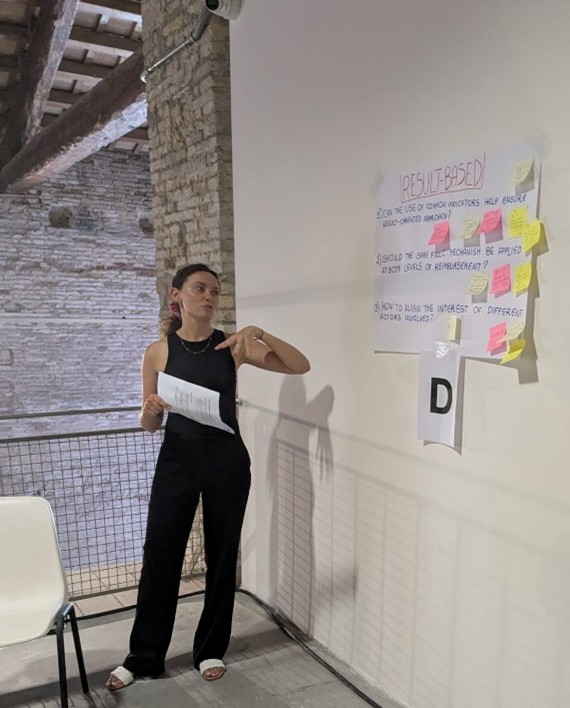 1) Results-based payment mechanisms post-2027: Facilitated by Arianna Mori, this session addressed the shift from compliance to results-based payments, with a focus on common indicators and Financing Not Linked to Costs (FNLC) in Cohesion Policy. Key insights:
1) Results-based payment mechanisms post-2027: Facilitated by Arianna Mori, this session addressed the shift from compliance to results-based payments, with a focus on common indicators and Financing Not Linked to Costs (FNLC) in Cohesion Policy. Key insights:
FNLC can work as a strategic lever to increase EU added value if backed by stronger programming capacity, rather than just acting as a simplification mechanism.
Programming well is crucial: defining results, methods, data sources and verification upfront; and involving beneficiaries early on, can ensure the feasibility and sustainability of milestones and targets.
Common indicators can act as payment triggers but need careful calibration to ensure they are suitable for disbursement mechanisms.
Aligning incentives across levels encourages both EU-national and national-beneficiary levels to strive towards the same objectives.
Built-in flexibility, the use of target ranges or bonuses for the achievement of the final result, enables ambition to be maintained while allowing course correction.
Risk-taking in R&I should be supported using instruments such as staged milestones to balance accountability with innovation.
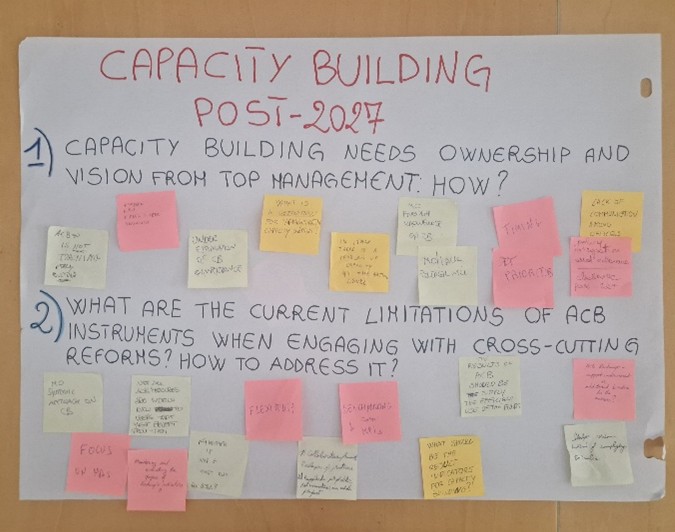 2) Administrative Capacity Building (ACB): Facilitated by Clarissa Amichetti, this session emphasised the importance of placing ACB at the centre of Cohesion Policy delivery. The MFF proposal frames it as a strategic objective, expanding beyond simplification and burden reduction to support governance, democracy, and institutional capacity at all levels. Key insights:
2) Administrative Capacity Building (ACB): Facilitated by Clarissa Amichetti, this session emphasised the importance of placing ACB at the centre of Cohesion Policy delivery. The MFF proposal frames it as a strategic objective, expanding beyond simplification and burden reduction to support governance, democracy, and institutional capacity at all levels. Key insights:
ACB should be treated as an investment rather than a cost, with clear strategies and timely activation.
A systemic approach to ACB is needed, embedding it into the programming cycle.
Modern tools should replace traditional methods, with peer-to-peer activities and more engaging formats responding to the real needs of managing authorities.
Progress of ACB interventions must be monitored, with improved systems to measure progresses.
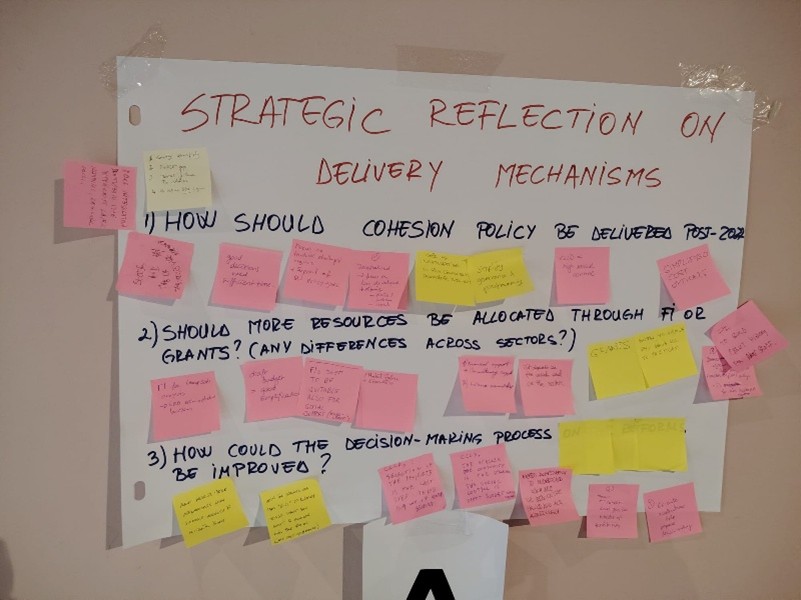 3) Cohesion policy delivery mechanisms: Led by Alessandro Fratini and Andrea Gramillano, this session focused on how financial instruments can enhance the effectiveness of Cohesion Policy. The MFF proposal positions financial instruments and guarantees as mainstream tools to leverage investment and complement grants. Key insights:
3) Cohesion policy delivery mechanisms: Led by Alessandro Fratini and Andrea Gramillano, this session focused on how financial instruments can enhance the effectiveness of Cohesion Policy. The MFF proposal positions financial instruments and guarantees as mainstream tools to leverage investment and complement grants. Key insights:
Financial instruments should be selected strategically, reflecting policy, sectoral, and territorial needs, and balancing grants and financial instruments to maximise impact.
Flexibility is a key strength, with delivery choices tailored to managing authority capacity and long-term administrative efficiency.
Strategic thinking is essential to overcome path dependency, encouraging openness to new approaches and strengthening analytical capacity for better delivery decisions.
Evidence-based decisions should be prioritised, using evaluations and ex-ante assessments to determine appropriate support tools or justify non-intervention.
Cross-border solutions deserve further exploration, including EU-level or transnational financial bodies, to help coordinate implementation.
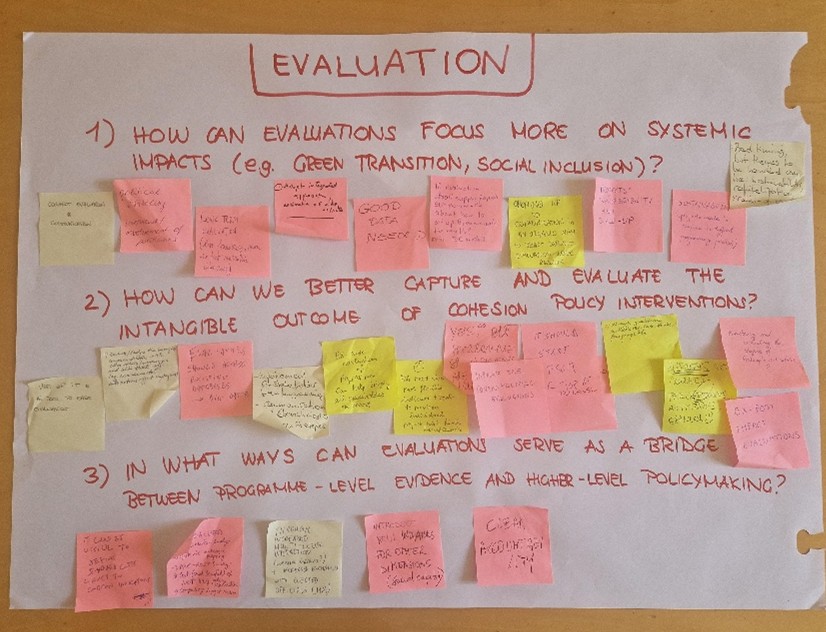 4) Monitoring and Evaluation (M&E): Cristina Neacșu led the discussion on how M&E can better capture systemic impacts and intangible outcomes in Cohesion Policy. The MFF proposal embeds evaluation implicitly – as a governance, learning and financial conditionality tool – but its implementation rules are still pending. Key insights:
4) Monitoring and Evaluation (M&E): Cristina Neacșu led the discussion on how M&E can better capture systemic impacts and intangible outcomes in Cohesion Policy. The MFF proposal embeds evaluation implicitly – as a governance, learning and financial conditionality tool – but its implementation rules are still pending. Key insights:
Evaluation should measure real impact, from wellbeing to territorial cohesion, aligned with EU strategies.
Systemic change requires new methods, combining proxy indicators with participatory and qualitative tools to capture intangible effects.
Build trust and enable learning, by designing M&E systems that empower institutions, support cooperation, and enhance feedback loops across governance levels.
Actionability and timing matter, with findings presented in accessible formats (e.g. dashboards) that support decision-making.
Co-creation enhances policy relevance, ensuring evaluators work closely with decision-makers and that evidence is linked to funding or regulatory decisions.
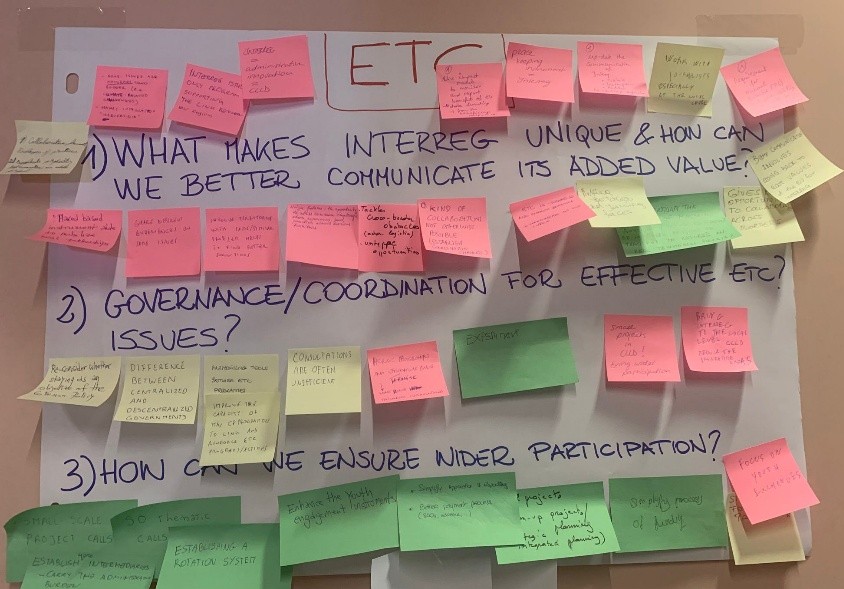 5) European Territorial Cooperation (ETC): Led by Dea Hrelja, this session explored the role of ETC and Interreg. The MFF proposal foresees a single Interreg Plan, increased budget allocation, stronger focus on accountability, simplification, and alignment with Union priorities. Key insights:
5) European Territorial Cooperation (ETC): Led by Dea Hrelja, this session explored the role of ETC and Interreg. The MFF proposal foresees a single Interreg Plan, increased budget allocation, stronger focus on accountability, simplification, and alignment with Union priorities. Key insights:
ETC fosters peace and cooperation in border regions, especially amid EU enlargement and external challenges.
Cross-border cooperation should be strengthened through mutual understanding, with initiatives such as language learning and youth exchanges.
Bottom-up actions from communities enhance inclusiveness, offering a way to co-design and implement projects despite legal and administrative complexity.
Improved coordination across cooperation strands and domestic programmes is key, through joint programming, thematic alignment, and harmonised rules.
Simplification and digital tools can lower barriers to entry, with small-scale projects and solutions like Jems and SCOs benefiting smaller actors.
For a deeper dive into the ideas that emerged from each roundtable, read the full paper “Building on experience, grounded in practice: Collective reflections on the European Commission’s Post-2027 Proposal” available here.
FEB 2026
DEC 2025
NOV 2025
OCT 2025
JUN 2025
MAY 2025